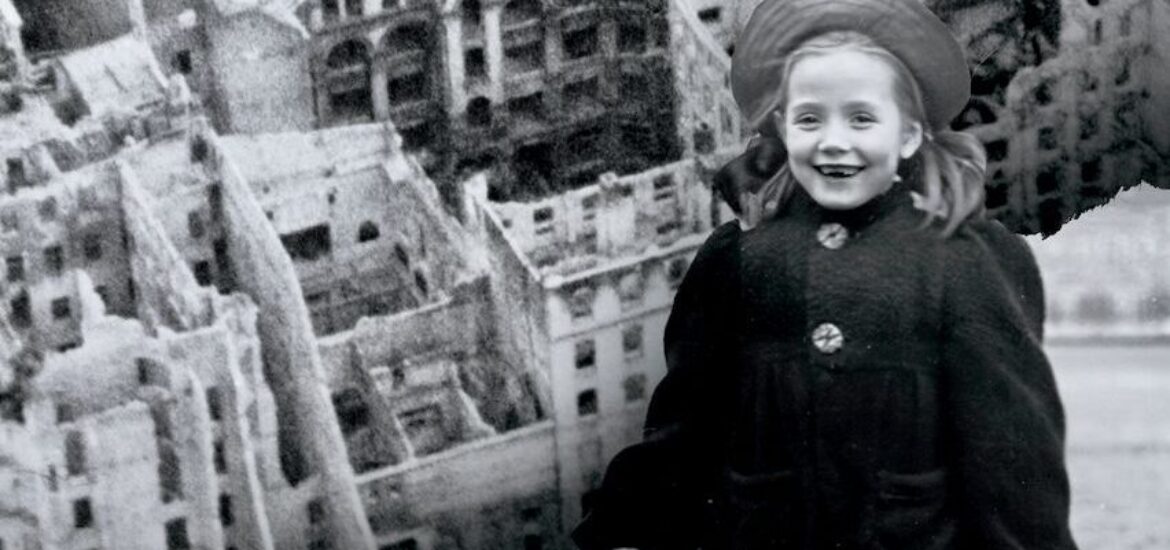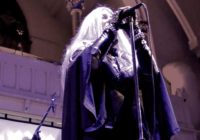A Child In Berlin tells the story of Heidi Posnien, a young lady that spent her childhood in WWII Berlin. Told in Heidi’s words during numerous audio interviews with biographer Rhonda Lauritzen. Through strong recollection the book is hard hitting, crushingly emotional, filled with pain, guilt, shame and often sinister and brutal but also stocked with moments of happiness, joy and redemption, encompassing life in that era.. All these things build the poignant tale of Posnien and her mother’s struggle to survive during the fall of Germany.
The book is the well-drafted, multi-year product of many sit down oral history sessions through dictation, Posnien’s oral history was recorded and edited into the words, memories and recollections vividly told through its pages, taking the reader back into that time, witnessing life through the child’s eyes, feeling every emotion good and bad. We witness her young mind try to understand and rationalize what happens to her and how the world she knew suddenly changed. Some memories are explained with detailed color giving waves of comfort and happiness while others sends shrieks of fear, panic and doubt fearing for her and others survival. We feel her fear and uncertainty not knowing when or, sometimes, if, her mom would come for her or come home.
This was life in WWII Germany through her POV. The center piece of the story is the remarkable, evolving relationship she had with her mother Käthe (Kathy/Kate) and her iron-will survival instinct against any situation or obstacle, to keep them both alive, whether together or separated. Other characters and personalities within the pages include her Oma and Opa (Grandma and Grandpa), sister Lucy, Tante Hedel, Lizzie, her childhood friend Uschi and others.
Lauritzen met Posnien on her publisher’s recommendation, what started off as an assumed short oral history session turned into a multi-year writing and personal relationship.
At first Lauritzen felt totally unqualified to write a story like this, though repeated chats with Posnien gave her confidence she could tell the story the way it’s presented. “It brings back memories every time we talk about it. We talk it over; it takes me right back again, in those days.”
Lauritzen’s schedule was pretty stacked at the time but the meeting and project was meant to be. “I was pretty much at capacity with my work. I thought we’d just do some family history, some oral history. Throw a quick story together and keep it small. I felt woefully unqualified to do a WWII story in Berlin. It’s not my beat. Then I got talking to Heidi and I just… I was amazed every time.”
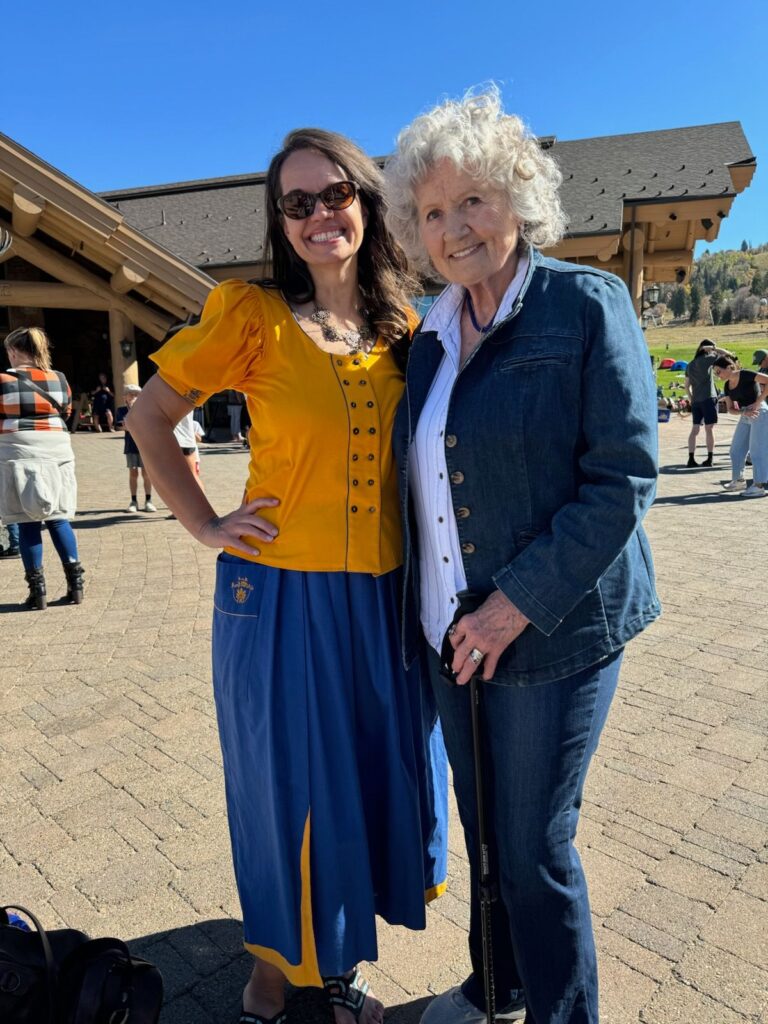 The story’s been in production since 2019.”I’ve been working on it continuously. At first I was telling it for family and not publication. You write things that always get cut, with the idea, does it serve the story. She gave me five years of oral history, there’s so many other scenes and details that (she) remembered that didn’t serve the narrative. I could’ve gone on forever.”
The story’s been in production since 2019.”I’ve been working on it continuously. At first I was telling it for family and not publication. You write things that always get cut, with the idea, does it serve the story. She gave me five years of oral history, there’s so many other scenes and details that (she) remembered that didn’t serve the narrative. I could’ve gone on forever.”
While the story takes place during WWII Berlin, major Nazi Reich players are relegated to passing mentions in time. Hitler is mentioned in a bizarre scene hosting a dinner party that Käthe attended, before his true intentions were known.
She wouldn’t give Lauritzen any spoilers, telling the story as it happened. “I remember one day, we’re talking and she said, yeah, my mother went to this dinner party where Adolf Hitler was presiding.” (Record scratching effect) “I was like, wait, what? You just told me your mother met Hitler.”
Posnien elaborates, “She didn’t talk to him, but he acknowledged her. He took a second and looked, because she was attractive, I guess. She was flattered.”
Lauritzen says: “That’s when she was still dating that Wehrmacht officer.” Posnien says her mom was still in the opera singing, still caught up in that world of the glamour years.
Joseph Goebbels wife Magda was there and how evil a woman she was. Lauritzen puts a unique perspective on her unspeakable actions during the final bunker days, ending her children’s lives. “She knew if her children survived, their lives would be terrible. Because of what would happen to them when the Russians came. They might’ve been murdered or tortured, I’m not excusing her behavior; it’s complicated.”
Posnien remembers women that jumped into the drinking water towers with their children not knowing what was gonna happen afterwards. It was horrible.
No positive light should ever be placed on Hitler but earlier in his career he was seen as a rockstar politician of his time. “Absolutely, people were so taken by the cult of him, they almost worshipped him. They would say, for us, all this we thank the Führer. The parade for his birthday, the pomp and circumstance, women were throwing themselves at him. He was very much a cult kind of rockstar thing at the time,” Lauritzen says.
While not mentioned in the story, Eva Braun’s association with Hitler came to light long ago. Was she innocent without knowledge of the Holocaust or did she know more than history grants her? “I think she was brow beaten maybe. In those days, women were not very strong. That’s why my mother was so different. I think she (Eva) was a plain simple girl. She was young and probably just worshipped him.”
He built the Volkswagen, and the Autobahn highway, Posnien says. “At the time Germany had come out of a depression and WWI and was terribly punished. He was building up the economy and technology. Life was good in 1939,” Lauritzen adds.
They both wave away any conspiracy theory that Hitler escaped the bunker. Some might call them crackpot theories but have been around even inspiring the reality show Hunting Hitler, claiming he found a way out traveling to Argentina. Lauritzen slams the lid on that, “No, any credible historian that I’ve read… said they found his teeth, the Russians were incredibly interested in making sure he was dead.” Posnien’s sure Hitler died underground.
One scene in her story has her walking down the street surrounded by bones and bodies, meeting up with a group of kids who were blowing up skulls with access gunpowder, for fun. Though it sounds disrespectful and morbid, given their surroundings and potential outlook, any kind of fun or entertainment found or invented was a welcomed distraction.
Posnien didn’t participate in the skullduggery. She earned her spot in the group after climbing into the wreckage of a grocery store retrieving boxes of sugar cookies and two salamis. She ate a few before holding the rations up, warning they better not take any since she did the work.
Another scavenging story painting the portrait of how desperate things were had Posnien in a crowded bombed out store surrounded by barren shelves. She waited for everyone to leave, jumped up to see a large wheel of cheddar cheese that’d been pushed all the way back. “That was a good time, the part with the cheese. I had to role-down parts at a time and take home.” When she got home her mother broke down in tears, too happy and grateful to worry about punishment for being in a dangerous area. Food was so scarce, it probably saved their lives. “Yeah extra protein.” Heidi quips.
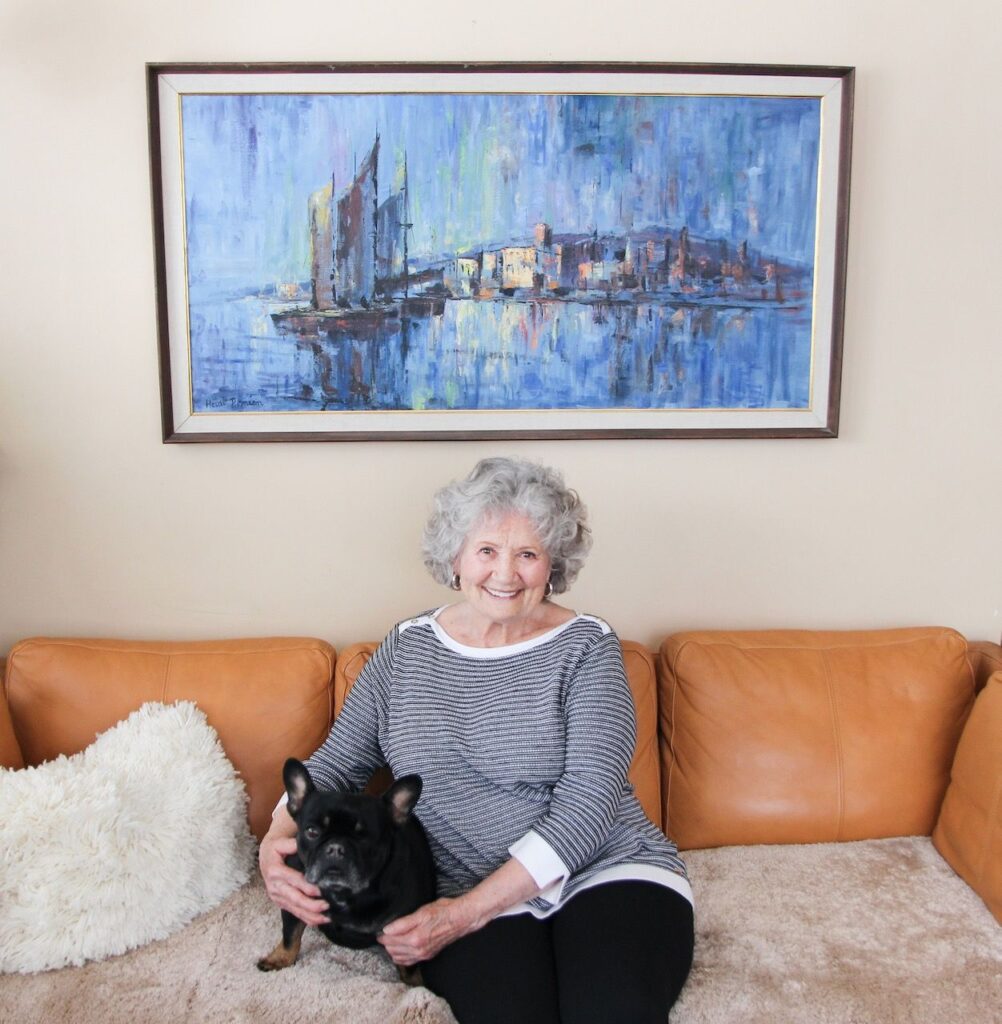 Her mom cooked meat she thought was rabbit once but was probably a cat. People might recoil at the thought, but stories like this painted the true cost of survival at any cost mindset. “It was protein and horsemeat too,” Posnien adds. “All those Belgium horses they had, they couldn’t feed them anymore so they had to butcher them. We stood in line to get a bucket of meat and protein.”
Her mom cooked meat she thought was rabbit once but was probably a cat. People might recoil at the thought, but stories like this painted the true cost of survival at any cost mindset. “It was protein and horsemeat too,” Posnien adds. “All those Belgium horses they had, they couldn’t feed them anymore so they had to butcher them. We stood in line to get a bucket of meat and protein.”
While Hitler and members of the Third Reich lived in luxury, thousands struggled for scraps and rations. Her mom did everything in her power to make sure they survived, including breaking her own heart leaving her at an orphanage. “It was hard; she tried not to show it.”
Lauritzen says, “She was a tough lady. She did what had to be done. She was also deeply affectionate and loving towards you. She believed the best way to protect you, was to educate you.”
Posnien says it was a nice orphanage, not what you always hear about. “They ran it perfect, the sisters were hugging us holding and loving on us and that helped us a lot.” She says if her mother had joined the Nazi’s she would’ve been a famous opera singer becoming soldier arm candy and all that stuff. “That wasn’t her thing.”
“She had a strong moral compass,” Lauritzen says.
She was three or four when she came to Berlin. Her memories were very vivid with detail but the timeline was unknown. The months and weeks unfolding as the war ended seemed like years.
Lauritzen’s interpretation of her words came across well, incorporating all the feeling and emotions described in the story. They understood each other and bonded over a chance same name coincidence. Her daughter’s married name was the same as Lauritzen’s married name, Rhonda Anderson.
One of the books most brutal heartbreaking scenes is when she sees a tank smashed into the ground, making a horrifying discovery as bullets ripped through the air. “Yeah scary, especially when you see people being shot and killed as your running, falling down, you don’t dare turn around and look, you just keep running. I don’t like talking about it too much because that’s just really brings back memories that aren’t pleasant.”
For all the positive memories there were days and experiences she doesn’t like to face but from heartbreak, to barely surviving, healing and her mother’s incredible, cleverness and heroism, she survived to tell the story. There were many hard moments during their numerous talks as she struggled at times, breaking down. They cried together several times. It wasn’t easy writing the book.
She became adapt at sewing food into clothes to trade and sell on the black market. James Joyce has a quote Lauritzen loves about that. “In the particular is contained the universal. So we see those obscure details about blowing up skulls or how you sell beans on the black market. We think it’s not relatable but the humanity comes through with all those, obscure details.”
While researching what was known and not known, Lauritzen came across some foretelling quotes, “They knew enough not to know or want to know. Magda Goebbels made the comment at the time. She became disillusioned with Hitler because he became so unwilling to see anything he didn’t want to see. She still believed in the national socialist party.” She was having lunch with Hitler in a café one day and was shocked when he saw a Jewish boy and said, “I’d like to squash that boy like a bug.” She was appalled later saying, I guess he really did.
There’s a scene where she sees a man sitting in the bedroom in what she assumes are old pajamas but didn’t know who he was or why he was there. Her mother’s training kicked in of always saying you don’t know anything. Certain things were done to keep her safe and in the dark, saying you didn’t see or hear anything. Lauritzen ponders whether he could’ve escaped from a concentration camp. “I suspect he was shuttled around from place to place or showed up at her door one night having escaped. Kathe didn’t want her to know anything that might endanger them.
“I think your mother couldn’t turn someone away. She gave clothes away. She was always giving things away and taking people in, helping people. She would give and never expected anything back from anyone.” Posnien says, “She never really got to do what she wanted to, but she did what she had to do. She wanted to be in the theater singing. That was her love. She had to give it all up just to survive.” The story definitely honors her memory and what she did to survive. Though she never realized her dream of performing, she did enjoy singing in German, taking cue from Marlene Dietrich, she would’ve appealed to American and German’s for sure.
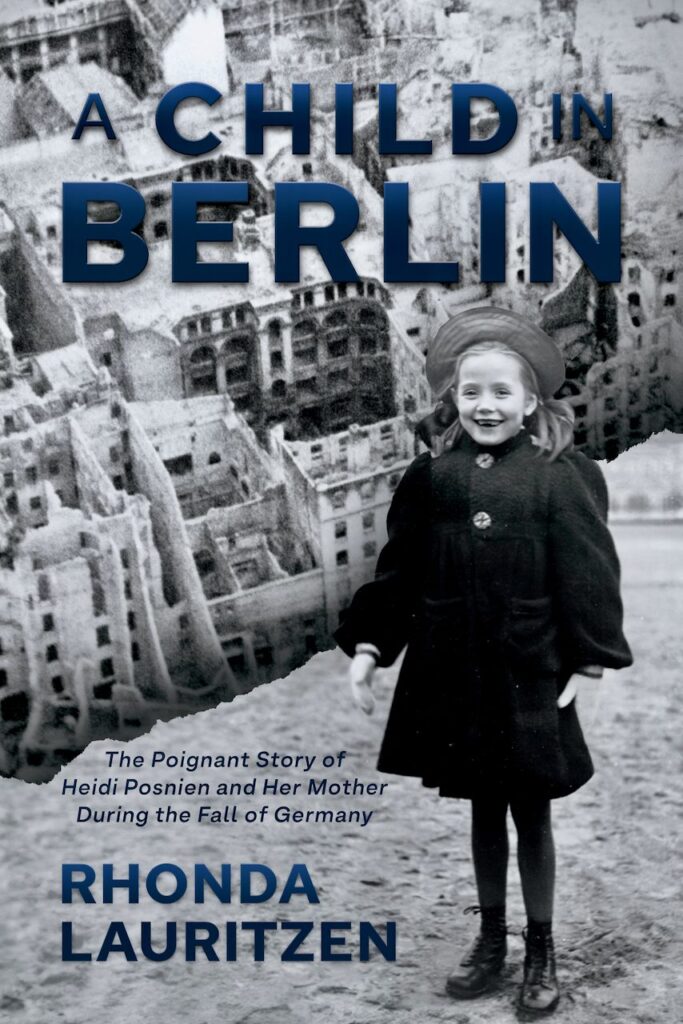 The last chapter of her childhood ends with everyone in the same Christmas Holiday decorated one bedroom where they were all staying at the time in someone else’s house. Käthe went out of her way to make Christmas as big as possible that year. It was cramped but they were all there together. “Germans love their Christmas.” Lauritzen says.
The last chapter of her childhood ends with everyone in the same Christmas Holiday decorated one bedroom where they were all staying at the time in someone else’s house. Käthe went out of her way to make Christmas as big as possible that year. It was cramped but they were all there together. “Germans love their Christmas.” Lauritzen says.
The story skips ahead to her move to the US and her modeling career. Unfortunately she suffered great loss in later years with both of her children. “There’s two sides to that, the losses (of her children) seemed so unfair, but Heidi, today, I see her, she has this beautiful home, overlooking the lake. It’s a very peaceful place. She knows how to be peaceful on her own. She learned that on her own.” It made her a stronger person.
A sequel is possible as her entire story is drafted. The question is whether there’s a market for it or if the sequel will just be for family. If the book takes off it’ll justify publishing. If not, then it’ll be just for them. So far they’ve done a library book signing and a private event for friends. Promotion is heating up; they’ve done radio interviews with some podcasts coming up.
The publishers already blown away by the books response. They didn’t expect it to sell as many copies as it has in the first few weeks. An audio book could be next.
She couldn’t wait to get to America. “I’m a patriot. I hang my flag out every day for any reason. I still say the pledge of allegiance even if I’m by myself. I’m proud to be an American.” She lives a content, happy life tending to her animals, farm house and still drives. God willing she’ll hit triple digits. She came to America in 1956 at 20. After the book, she’s even dreaming in German again. She learned French by listening and Polish by the songs her grandmother sang to her. She’s always been good with languages.
“If she’d (Käthe) had ended up in a concentration camp as opposed to a prison, if she hadn’t been pregnant I think she wouldn’t have made it. She was so savvy with how she got along with people. She was a survivor.” Lauritzen speculates. Her singing and theater training helped her communicate and mingle with everyone. She was extroverted and clever.
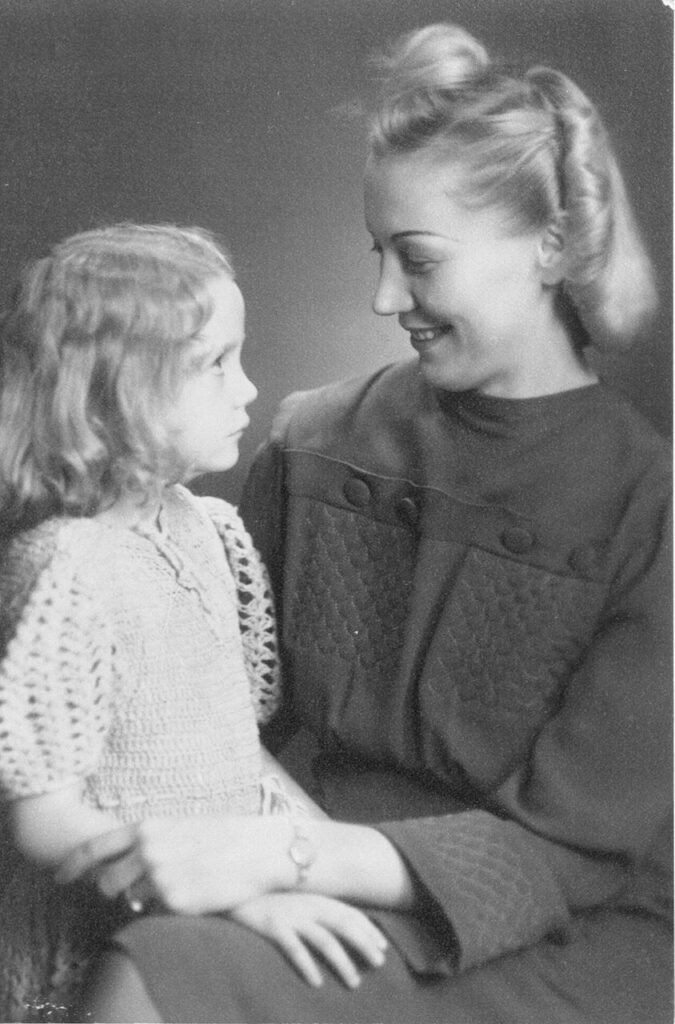 Lauritzen says the books a story of survival and resilience. True stories are her jam. “They’re more remarkable for me then fiction. I love telling the story’s of regular people that you wouldn’t know. I’m passionate about helping people tell their own stories. To capture oral history of their family’s and loved ones, themselves, in voice.”
Lauritzen says the books a story of survival and resilience. True stories are her jam. “They’re more remarkable for me then fiction. I love telling the story’s of regular people that you wouldn’t know. I’m passionate about helping people tell their own stories. To capture oral history of their family’s and loved ones, themselves, in voice.”
To this day Posnien and a friend frequent the opera. ”She and I go in as one. It reminds me of my mom. One of my favorites is Madam Butterfly. When she sings “One Fine Day,” I still have tears running down my face.”
The first movie she ever saw was Son of Bernadette, she saw it for free. A random story in the books finds Posnien outside after the rain, telling a well dressed man to not sit on a wet bench and ruin his suit. He comments, what a lovely child, escorting her to the theater he owned, saying she could come in any time she likes, on him.
Posnien smirked about her modeling days, still turning the heads of younger men. Wishing they’d known her back in the day. A lot of people were in love with her.”
A lot of the black market street knowledge she learned on her own along with scavenging. Her mother taught her how to roll cigarettes and recork the wine, and paper for the lentils. They traded a lot, if you got your hands on a lot of condescend milk, some of it you traded with someone who had sugar. We had a lot of brown sugar. We traded off, same thing with clothing, my mother made a skirt for this young girl out of an umbrella. She took the umbrella top off and made a skirt out of it.”
“That’s a story that didn’t make the book. She found this little girl alone peddling on the street with no clothes. Mom made her a skirt and found a place for her to go.”
Posnien says, “There were a lot of instances like that. The cake story was the worst, I cried so hard. I felt so bad for my mom. She worked so hard to make that cake. It hurt me so much that I hurt her.” Lauritzen says, “To me that was one of the worst and lowest moments in the book. There other tragic moments but that one was hard.”
At one point she finds and befriends a stray dog that becomes her companion for about a week or so. She was staying with different people to trade food. “He found his own way, I lost him, don’t know where he went. I liked snuggling with him. ”It’s possible he was caught or killed for meat.
The rumors were there and people were seen leaving their homes and never returning. “You saw people getting hauled away. They knew the people that were leaving were their Jewish neighbors, never heard from again. If you had your eyes open you could see that something terrible was happening. The rumors started coming back about the concentration camps. Some historians and psychologists call it an ‘imagination gap.’ They couldn’t imagine it was actually true, had to be propaganda. She says she’s never been to a concentration camp, “I can’t do that. It’s too hard.”
Lauritzen’s father served in the army after WWII and the American army took over Dachau. As a base, he lived in the barracks inside Dachau for a year. He is so haunted by that. Now, he’s at the end of life. He keeps going back to that, out of all the things he keeps talking about. Every time we seen him he talks about how haunting it was to live in that concentration camp for a year. He can’t shake it. He wasn’t there to liberate it. He was just there, after. It never left him.”
“I try and avoid things like that. I’m here in America now and I’m happy. That was in the past in another lifetime. I was lucky.”
The story covers one of the darkest periods in history but proves that moments of light and hope shined through. Her family is forever honored and memorialized through images and words and an inspiration for years to come.
Demand for the book has been high and they’re waiting on more from backorder. Lauritzen says while not a companion piece, the Anthony Hopkins movie One Life, tells the tale of a man saving several children out of Czechoslovakia.
A Child In Berlin covers one of the darkest periods in history but proves that moments of light and hope shined through. Though her incredible story, her family is forever honored and memorialized through images and words and an inspiration for years to come.
Check out Lauritzen’s other work at https://evalogue.life/rhonda-lauritzen/

